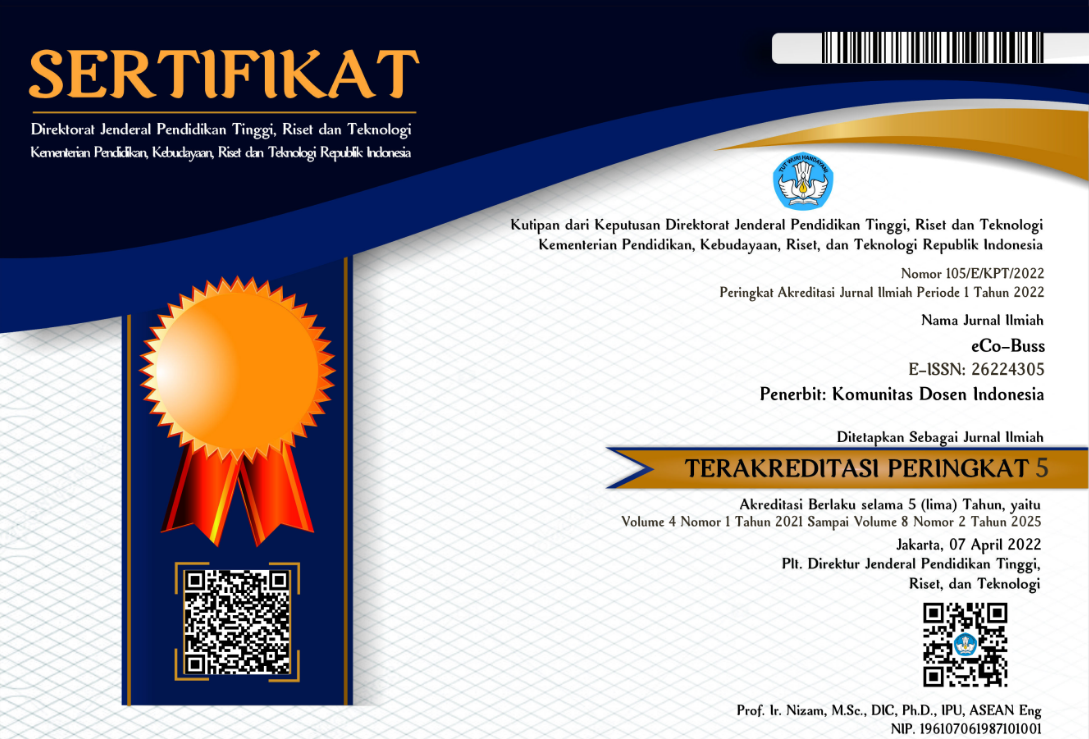Analysis of the Compliance Level of Micro, Small and Medium Enterprises Taxpayers after the implementation of Government Regulation Number 23 of 2018
DOI:
https://doi.org/10.32877/eb.v3i3.203
Abstract
Tax has an important role in realizing government programs for the welfare of the people, for this reason the government tries to encourage potential compliance of taxpayers for Micro, Small and Medium Enterprises to increase the amount of regional income through various policies issued by the Directorate General of Taxes so that tax revenue targets can be achieved. This study aims to determine the level of taxpayer compliance of Micro, Small and Medium Enterprises with the independent variables used are knowledge of taxation, understanding of tax regulations and awareness of taxpayers. The research sample was using purposive sampling technique taken and obtained as many as 67 respondents who were used as samples. The data analysis technique used classical assumption test, hypothesis test and data analysis. The results of data processing showed variable tax knowledge has a value of t count 2,034> 1,998 t table, variable understanding of tax laws has value t 2,293> 1,998 t table and taxpayer awareness variable has a value of t count 2,084> 1,998 t table F test simultaneous test results on the significant value of 0.000> 0.05 with f value count 28 299> 2.75 f table so that we can conclude the independent variables jointly significant effect on tax compliance
Downloads
References
Bisnis Indonesia. (2019). Masih Minim, Penerimaan Pajak dari Sektor UMKM - Ekonomi Bisnis.com. https://ekonomi.bisnis.com/read/20190502/259/917630/masih-minim-penerimaan-pajak-dari-sektor-umkm
Cicalengka, S. D. (2020). Daftar Registrasi UMKM di Desa Cicalengka.
Darussalam, D. S., Kristiaji, B. B., & Vissaro, D. (2019). Era Baru Hubungan Otoritas Pajak dengan Wajib Pajak. Jakarta: DDTC.
Diskominfo Kota Tangerang. (2020). UMKM di Kota Tangerang Bertambah Ribuan dalam Tiga Tahun. https://umkm.tangerangkota.go.id/list-berita/berita/kFXi4e
Eriksen, K., & Fallan, L. (1996). Tax knowledge and attitudes towards taxation; A report on a quasi-experiment. Journal of Economic Psychology, 17(3), 387–402.
Ghozali, I. (2018). Aplikasi Analisis Multivariate Dengan Program IBM SPSS 25 (9th ed.). Badan Penerbit Universitas Diponegoro.
James, S., & Alley, C. (2009). Tax Compliance , Self-Assessment and Tax Administration School of Business and Economics , University of Exeter. Journal of Finance and Management in Public Services, 2(2), 27–42. http://hdl.handle.net/10036/47458
Khairiyah, Y. R., & Akhmadi, M. H. (2019). Studi Kualitatif?: Dampak Kebijakan Insentif Pajak Usaha Kecil Dan Menengah Terhadap Kepatuhan Pajak Dan Penerimaan Negara. Jurnal Manajemen Keuangan Publik, 3(2), 36–45. https://doi.org/10.31092/jmkp.v3i2.620
Lestari, C. A., & Yushita, A. N. (2017). Pengaruh Pengetahuan Perpajakan dan Pemahaman Peraturan Pemerintah No. 46 Tahun 2013 Terhadap Kepatuhan Wajib Pajak (Studi Empiris pada UMKM di Sentra Kerajinan Batik Kabupaten Bantul). Jurnal Profita: Kajian Ilmu Akuntansi, 5(4).
Pajak.go.id. (2018). Peraturan Pemerintah Nomor 23 Tahun 2018. https://pajak.go.id/sites/default/files/2019-05/PP Nomor 23 Tahun 2018.pdf
Pajak, D. J. (2018). Pajak Tuntas, UMKM Naik Kelas | Direktorat Jenderal Pajak. https://www.pajak.go.id/artikel/pajak-tuntas-umkm-naik-kelas
Palil, M. R., & Mustapha, A. F. (2011). Factors affecting tax compliance behaviour in self assessment system. African Journal of Business Management, 5(33), 12864–12872.
Raosoft, I. (2020). Sample Size Calculator by Raosoft, Inc. http://www.raosoft.com/samplesize.html
Statistik Provinsi Banten. (2019). Dinas Koperasi dan UKM | Statistik Provinsi Banten. https://statistik.bantenprov.go.id/ekonomi/koperasi
Wardani, D. K., & Rumiyatun, R. (2017). Pengaruh Pengetahuan Wajib Pajak, Kesadaran Wajib Pajak, Sanksi Pajak Kendaraan Bermotor, Dan Sistem Samsat Drive Thru Terhadap Kepatuhan Wajib Pajak Kendaraan Bermotor. Jurnal Akuntansi, 5(1), 15–24.
Webley, P., Adams, C., & Elffers, H. (2002). Value Added Tax Compliance in the United Kingdom. In Behavioral Public Finance.






 DOI :
DOI :
 Abstract views: 796
/
Abstract views: 796
/  PDF downloads: 648
PDF downloads: 648

